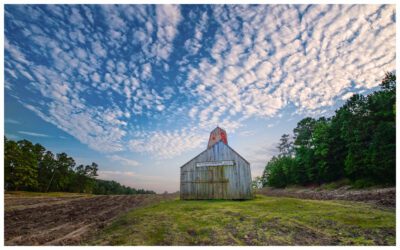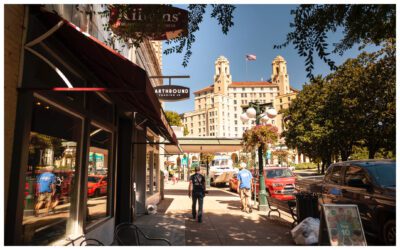[title subtitle=”words: Pineapple Public Relations
image: courtesy Augusta Convention & Visitors Bureau “][/title]
Ingrained in the minds of most as the home of the iconic Masters® Tournament, Augusta, Georgia’s rich history runs much deeper than the manicured greens and famed pimento cheese sandwiches. While thousands of visitors descend on this bustling city year after year for the prestigious tournament, Augusta’s famous golf course, Augusta National, holds years of history beneath its rich soil. Trotted on by fans from all over the world eager to look on as their favorite golfer takes a swing at winning the coveted green jacket, learning the history behind the course and city is undoubtedly the key to understanding the deep tradition that this city holds so dearly.
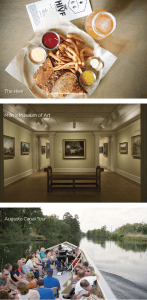 The 1800s were a fruitful time for the city of Augusta, specifically for what is now known as the most iconic golf course in the world. Before the course was home to the world-renowned golf tournament, the property served as home to three million peach trees.
The 1800s were a fruitful time for the city of Augusta, specifically for what is now known as the most iconic golf course in the world. Before the course was home to the world-renowned golf tournament, the property served as home to three million peach trees.
The history of this course dates back to 1853, when Augusta judge, Benjamin Warren, sold his 315-acre property to a local indigo farmer named Dennis Redmond, who named the property “Fruitland.” He grew peaches, apples, grapes, strawberries and many kinds of trees and shrubs. Redmond also began building a large house on the property that he called, “Fruitland Manor.” In 1858, Prosper Berckmans acquired ownership of Fruitland from Redmond and purchased the surrounding lands to expand the nursery and make Fruitland Manor his home.
Prosper soon became a well-known horticulturalist and the “Father of the Peach Culture” across the South as his nursery business took off. When he arrived in Georgia, there were approximately 100,000 peach trees primarily located on family farms throughout the state. In 1858, he shipped the first Georgia peaches to the New York market. By 1861, the Berckmans were producing over 300 kinds of peaches and many other kinds of fruits and trees at Fruitland. During Prosper’s lifetime, he had introduced or improved three of the five main varieties of Georgia peaches. During Prosper’s fifty years of extensive research on peaches, he planted more than three million peach trees in Augusta, according to Berckmans’ family documents.
Following Prosper’s death in 1910, his three sons carried on the business. His oldest son, Louis Alphonse, became president of the company. His second son, Robert Craig, served as vice president, and youngest son, Prosper Jules Alphonse, Jr. (“Allie”) was secretary and treasurer. Both Louis and Allie were active landscape designers and carried out Fruitland’s landscaping department successfully. Louis was also the garden designer for Radio City Music Hall in New York and designed numerous golf courses around the country. In 1912, the Berckmans brothers struck the largest peach deal ever made in Georgia. According to The Augusta Chronicle, the brothers sold their entire year’s peach crop to a New Jersey firm for an estimated $100,000.00.
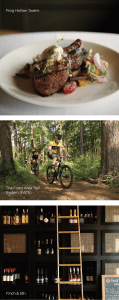 As the early twentieth century progressed, Augusta was becoming a small winter retreat for wealthy northerners. In 1925, Miami hotel mogul, J. Perry Commodore Stoltz, saw the opportunity and purchased the Fruitland property in an attempt to build his winter resort “Augusta Fleetwood Resort.” His construction was never completed, and the Fruitland property was idle for the remainder of the 1920s. In 1931, the property was eventually sold for the reported amount of $70,000 to establish a golf course that has forever placed Augusta on the map as an internationally recognized center for golf. After the acquisition, Prosper’s two sons, L.A. and Allie Berckmans, returned to the Fruitland property and assisted in the landscape design of the famous golf club. The Berckmans’ family home remains on the original Fruitland property and serves as their clubhouse today.
As the early twentieth century progressed, Augusta was becoming a small winter retreat for wealthy northerners. In 1925, Miami hotel mogul, J. Perry Commodore Stoltz, saw the opportunity and purchased the Fruitland property in an attempt to build his winter resort “Augusta Fleetwood Resort.” His construction was never completed, and the Fruitland property was idle for the remainder of the 1920s. In 1931, the property was eventually sold for the reported amount of $70,000 to establish a golf course that has forever placed Augusta on the map as an internationally recognized center for golf. After the acquisition, Prosper’s two sons, L.A. and Allie Berckmans, returned to the Fruitland property and assisted in the landscape design of the famous golf club. The Berckmans’ family home remains on the original Fruitland property and serves as their clubhouse today.
Decades later, to preserve the history and to pay homage to the Berckmans, Augusta’s surrounding community, along with millions of Americans around the globe, continue to embrace the rich traditions inside the gates of the Masters® Tournament. While the golf culture will always reign supreme in this unique city, those who do not have the opportunity to venture to Augusta for the tournament can experience a whole new scene filled with art, history, adventure and delectable cuisine outside of the gates.
Off the putting green and away from the budding azaleas, guests can customize their visit to fit any adventure or personality type. Explorers seeking a bit of serenity and a place to stretch their legs can stroll along Augusta’s Riverwalk, take a cruise down the Augusta Canal on the Petersburg Boat Tour, enjoy a nature walk at Phinizy Swamp or a fun bike ride through the Forks Area Trail System (FATS).
For art enthusiasts, a visit to the only non-profit contemporary gallery and visual arts school in the region, Gertrude Herbert Institute of Art, is a must. The institute offers a variety of art classes for youth and adults year-round. Also, guests will want to check out the first museum dedicated to the art and artists of the American South, the Morris Museum of Art.
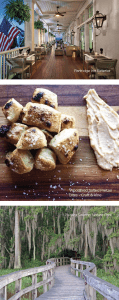 Historians will enjoy The Augusta Museum of History and the unique exhibits that await inside. Take an in-depth look at the man, music, and legacy of Augusta native, James Brown, at the one-of-a-kind exhibit honoring The Godfather of Soul’s life. Golf fans will enjoy an up-close look at a green jacket, learning the history of the sport and the region’s rich golf past. Visitors can walk back through time and tour Summerville, one of Augusta’s seven historic districts, which began as a summer resort for wealthy Augustans who sought refuge from the heat and mosquitoes, near the Savannah River. Visitors can also walk the halls of the home where President Woodrow Wilson lived as a boy and hear how some of his childhood experiences shaped the nation’s twenty-eighth presidency.
Historians will enjoy The Augusta Museum of History and the unique exhibits that await inside. Take an in-depth look at the man, music, and legacy of Augusta native, James Brown, at the one-of-a-kind exhibit honoring The Godfather of Soul’s life. Golf fans will enjoy an up-close look at a green jacket, learning the history of the sport and the region’s rich golf past. Visitors can walk back through time and tour Summerville, one of Augusta’s seven historic districts, which began as a summer resort for wealthy Augustans who sought refuge from the heat and mosquitoes, near the Savannah River. Visitors can also walk the halls of the home where President Woodrow Wilson lived as a boy and hear how some of his childhood experiences shaped the nation’s twenty-eighth presidency.
Foodies will enjoy the regionally and nationally acclaimed Augusta restaurants, such as The Hive, Finch & 5th, Frog Hollow Tavern, Abel Brown, and Honey from the Rock Café. Many of Augusta’s staple restaurants even feature Masters®-themed food items on their menu. To satisfy the pimento cheese craving, customers can drop into Craft & Vine for their delicious Woodfired Salted Pretzel Bites. Served up soft, salty and warm with pimento cheese fondue, this mouthwatering dish serves as a tasty tribute to the traditional course favorite.
Guests looking for a place to call home during a visit can book a room at the Augusta Marriot at the Convention Center, which is centrally located on the Riverwalk, making it easy to leave the car behind and traverse downtown by foot. The Partridge Inn, located in the historic Summerville neighborhood, is a beautiful hotel that is more than a hundred years old. Augusta’s best-kept secret, Olde Towne Inn, is located on the edge of downtown near restaurants, nightlife, and entertainment.
While traditional history remains at the root of this momentous city’s identity, that hasn’t stopped this Peach State gem from incorporating a fresh new vibe into their rapidly growing future. With so much to do and so much to see, Augusta is a city on the rise worth catching on its way up.
For more information, see visitaugusta.com.


